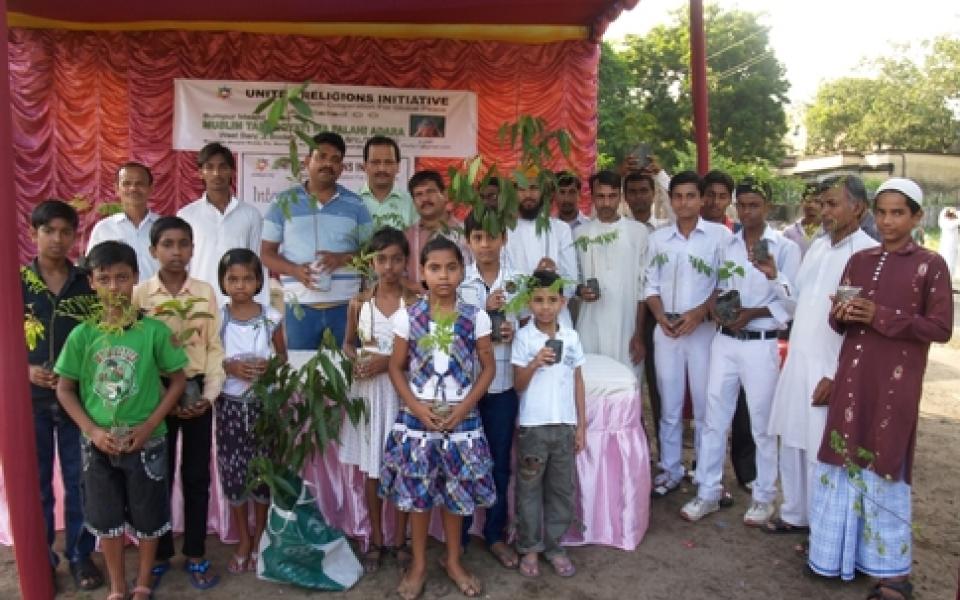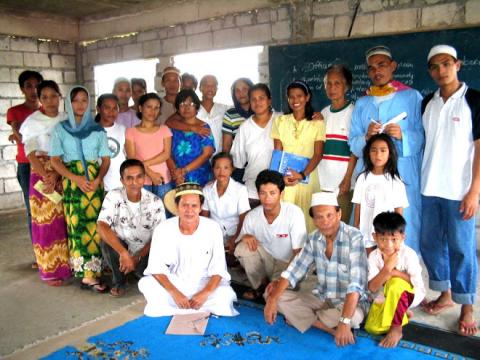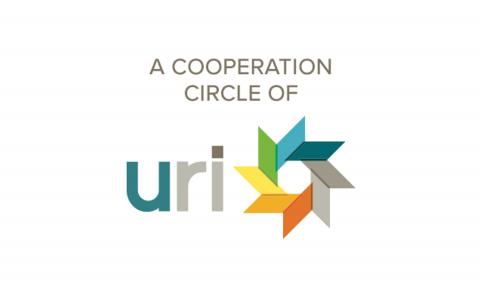
Members of Muslim Taraqqyati Wa Falahi Adara Cooperation Circle
These three URI Cooperation Circles strengthen their communities through providing educational opportunities for all. By learning about different cultures, group members find ways to weave the needs of many traditions together so that all can thrive. From providing computer education and livelihood skills, to educating and empowering women, to training community members in organic farming, to providing literacy opportunities, these Cooperation Circles are using interfaith education methods to contribute to a more peaceful, more productive society.
Rainbow CC, West Bengal, India
Rainbow CC engages youth in creating local employment opportunities by bringing technology, products marketing, and educational programs to the region. Rainbow CC is focused on bridging the gap between elders and youth by creating a common platform for dialogue to address issues and social challenges. The CC runs local computer training programs, vocational training programs, educational training programs, environmental care programs, education about organic farming, health camps for rural children, and literacy programs for children and elders.
“When we started our CC, we felt the need to bring youth together from different castes and regions to collaboratively address the unemployment situation … So we started cultivating interfaith relationships among youth at the college level. Then we realized each individual has their unique ideas which could strengthen our network. We followed the knowledge and realized that this can help us to create an interfaith social platform, where we can share and learn from each other.”
CC members visited a tribal village to learn about local challenges, and saw how tribal women collected a specific type of leaf to make a biodegradable plate, which they sold at local markets. However, because of the lack of knowledge about the livelihoods of tribal people, there was mass logging in the area. The trees were being cut down without a chance to regenerate. “We started discussing the matter with local government, expressing our concern on how corporate expansion disrupts the earning process of tribal women. Finally the local government split the tender into various zones and started cutting the trees wisely. This action has helped women to get leaves all around the year. This story was featured in the local news and government has applauded our innovative interfaith approach to addressing this challenge.”
CLICK HERE TO READ THEIR FULL CC PROFILE
Muslim Taraqqyati Wa Falahi Adara, West Bengal, India
With the help of the Ektaan CC and URI Eastern India team, Muslim Taraqqyati Wa Falahi Adara CC opened a computer center inside a local mosque, where it provides computer skills training to children of various faiths. This was the first time in the region (Burnpur, West Bengal), that this type of training was made available. In addition to interfaith education, the group conducts environmental programs at sacred sites of various faith traditions and promotes health care within the local community by providing free medicine and education about indigenous local treatments.
Providing computer skills is a large benefit to the community. “In our society, education is a large challenge and computer training is not readily available. Increasingly, computer education has become a must for success in all levels of society. It has been decided jointly by the members of our CC to run this project via voluntary service by computer professionals.”
Not only does the CC’s computer education process help community members increase their practical skillsets, but the process also helps interfaith relations. “Since the children from various faith communities are coming to learn at the computer centre, their parents often accompany them, and get a chance to interact with each other. Similarly in our medical dispensaries, there are people from different faith communities that come to receive treatment, and these services are provided to all castes and religions.
CLICK HERE TO READ THEIR FULL CC PROFILE
Buddha Education Foundation CC, Rohini, Delhi, India
Buddha Education Foundation was started in 2009 to provide moral education on universal principles to young children from all communities. It currently has 135 centers in four states and 5,420 enrolled students in rural Rajasthan, Haryana and Madhya Pradesh. Buddha Education Foundation’s programs primarily focus on providing free education and study material for students. “The young mind is trained here on how to live in peace and harmony in a society with different cultures, ethnic diversity, and linguistic multiplicity. Our grassroots effort teaches students how to resolve their own differences and befriend all.”
The organization imparts moral education, holds examinations, and confers certificates of completion of courses. It also works to benefit women from marginalized sections of society. On the International Day of Women, the CC organized an awareness generation campaign on women’s empowerment in an economically disadvantaged area. “Seeing males voluntarily attend and participate in the program was very encouraging; it was first time in their life they heard about women’s empowerment. Many resolved to continue working for the cause.”
During the first Women’s Day program with economically disadvantaged communities in Shahpur, “the women in attendance were mostly illiterate housewives whose husbands were factory workers, street hawkers, and rickshaw pullers. They were unaware of their rights and privileges, and hesitated in sharing their pain and suffering in public.” One 21-year-old Hindu woman with two small babies finally stood up and said, “I will speak. We women live like animals. We women work the whole day and at night, and get beaten by husbands who are drunkards or drug addicts. I was hesitant to share this before because no one until today has asked us to speak.” According to the CC, “Interfaith experience with us made her bold and vocal. This was just the beginning. Soon after, everyone wanted to speak and had the opportunity to share their problems. It was a bonding experience for women from different faith traditions to realize the similarities in their situations.”
CLICK HERE TO READ THEIR FULL CC PROFILE



